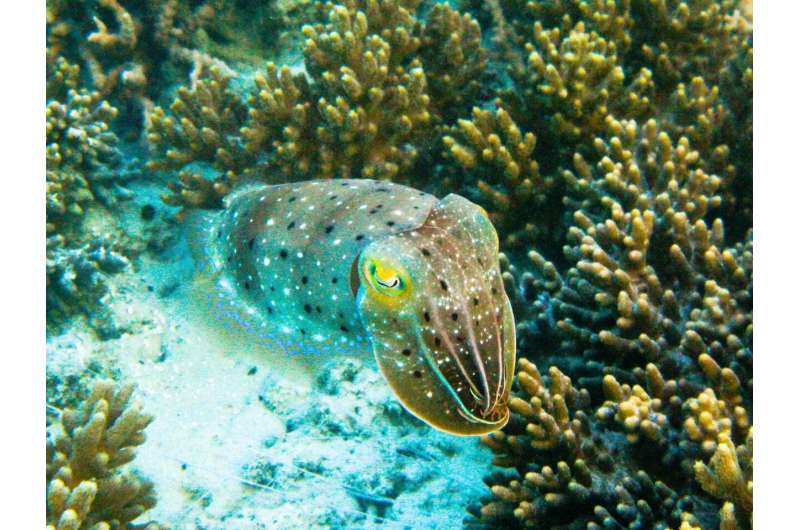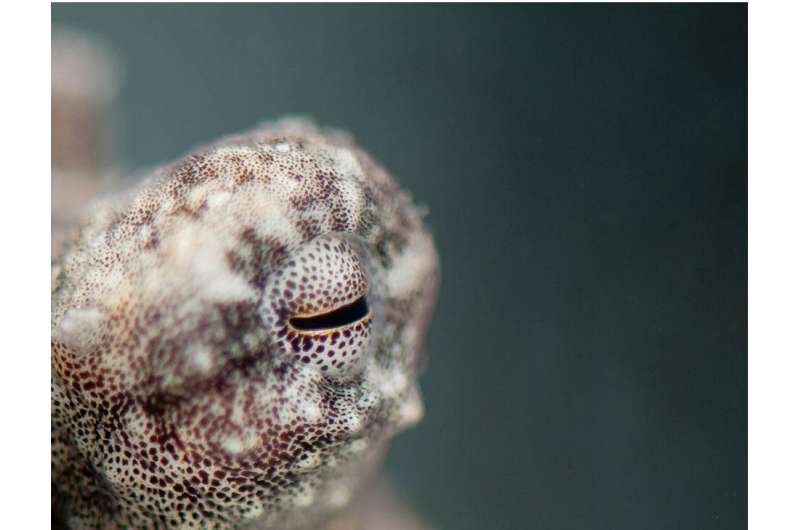Insights from color-blind octopus help fight human sight loss

University of Bristol research into octopus vision has led to a quick and easy test that helps optometrists identify people who are at greater risk of macular degeneration, the leading cause of incurable sight loss.
The basis for this breakthrough was published in the latest issue of the Journal of Experimental Biology and describes new technology developed by lead researcher, Professor Shelby Temple, to measure how well octopus—which are color-blind—could detect polarized light, an aspect of light that humans can't readily see. Using this novel technology, the research team showed that octopus have the most sensitive polarization vision system of any animal tested to date. Subsequent research used the same technology in humans and led to the development of a novel medical device that assesses the risk factor for sight loss later in life.
Prof Shelby Temple, who holds honorary positions at the School of Biological Sciences, University of Bristol and the School of Optometry, Aston University, explained the impact of the team's findings. He said: "We knew that octopus, like many marine species, could see patterns in polarized light much like we see color, but we had no idea that they could do so when the light was only 2% polarized—that was an exciting surprise, but even more surprising was when we then tested humans and found that they were able to see polarization patterns when the light was only 24% polarized.
"Humans can perceive polarized because macular pigments in our eyes differentially absorb violet-blue light depending on its angle of polarization, an effect known as Haidinger's brushes. It's like a super sense most of us don't even know we have, revealing a faint yellow bow-tie shape on the retina. The more of these pigments a person has, the better protected they are against sight-loss.

"By inventing a method to measure polarization vision in octopuses, we were able to use the core technology to develop a novel ophthalmic device that can quickly and easily screen people for low macular pigments, a strong risk factor for increased susceptibility to macular degeneration."
Macular pigments are the body's natural protection against damaging violet-blue light. This new testing approach enables optometrists to provide preventative advice to patients. Empowering patients to make simple lifestyle choices, like wearing sunglasses or eating more dark green and brightly colored fruits and vegetables that can help them protect their sight through life.
Prof Temple said, "I am so happy this work has been published, as it was the foundation upon which we developed our exciting new technology for measuring macular pigments."
Macular pigments are the carotenoids lutein, zeaxanthin and meso-zeaxanthin that we can only acquire from our diet. They provide long term protection to the retina and this helps prevent age-related macular degeneration by acting as antioxidants and by strongly absorbing the most damaging high energy visible (violet-blue) wavelengths (380-500 nm) of light that reach our retina. A challenge to the eye care industry is that it is not possible to determine someone's macular pigment levels without measurement, and until now most techniques have been too time consuming, difficult, or expensive to become part of regular eye exams.
The new technology developed by Prof Temple through his start-up company Azul Optics Ltd, enables rapid screening of macular pigment levels and can be used on patients from 5 -95 years of age. Prof Temple added: "We are all living longer and expecting to do more in our older age, so I hope this serendipitous invention will help empower people to do more to look after our eyes, so they don't suffer from this devastating disease."
More information: Shelby E. Temple et al. Thresholds of polarization vision in octopuses, Journal of Experimental Biology (2021). DOI: 10.1242/jeb.240812
Journal information: Journal of Experimental Biology
Provided by University of Bristol


















